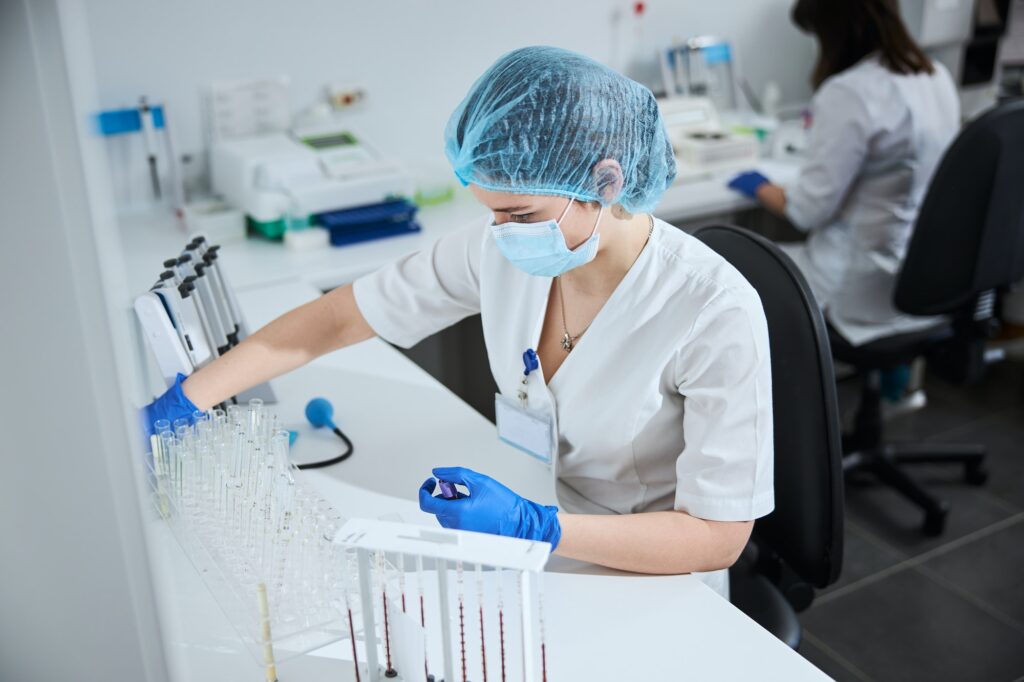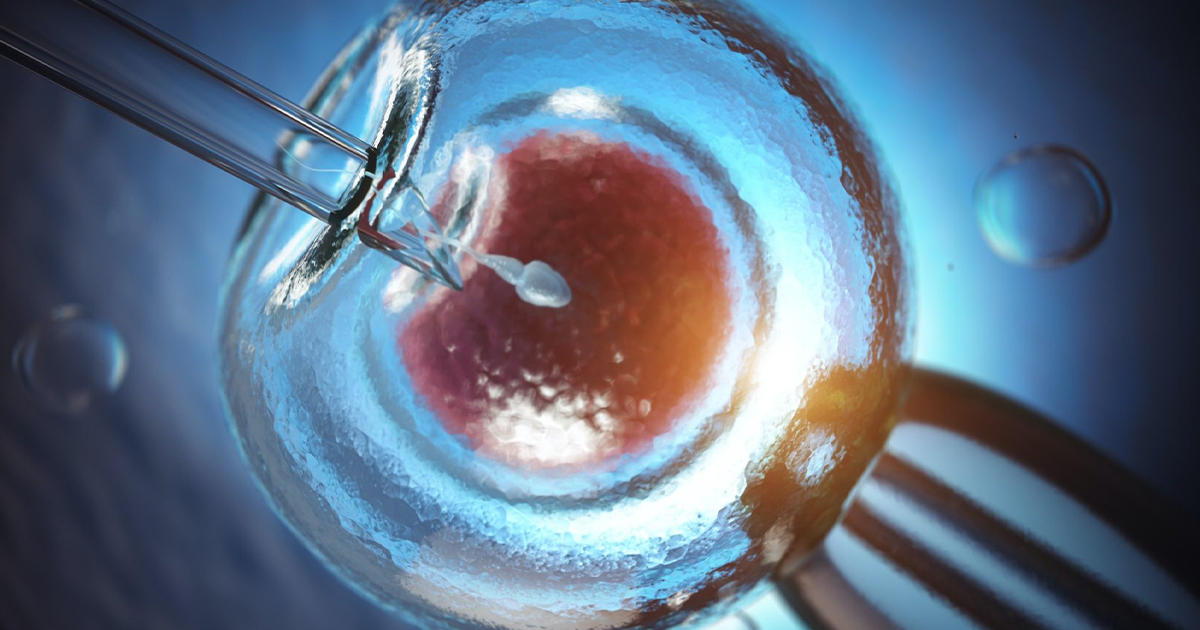What You Need to Know About IVF
IVF Treatment (In Vitro Fertilization): For couples who cannot conceive with first-line treatments (Insemination and Ovulation Treatment), the next step is in vitro fertilization (IVF), also known as the test-tube baby method.
Compared to insemination treatment, IVF has five times higher pregnancy success rates and is currently the most effective fertility treatment. It is particularly beneficial for older women, women with damaged fallopian tubes, male factor infertility, and many other cases.
Basic Information About IVF
- During IVF, eggs are collected from the woman’s ovaries through a non-invasive surgical procedure and fertilized by sperm in our laboratory.
- If the male partner’s semen analysis is abnormal, fertilization is achieved by injecting a single sperm into each egg using a procedure called Intracytoplasmic Sperm Injection (ICSI).
- Each treatment cycle is referred to as an IVF cycle, which lasts about 2 to 4 weeks and ends with the collection of multiple eggs from the woman’s ovaries and their fertilization by sperm.
- The fertilized eggs, now called embryos, are placed in the woman’s uterus on the third or fifth day after fertilization, or can be frozen for use in a subsequent cycle.
- Before embryo transfer, embryos may undergo genetic testing. With our PGT-A and PGT-M tests, we can detect genetic defects or chromosomal abnormalities before using the embryo in the IVF cycle.
- PGT-A and PGT-M tests have been shown to increase success rates, reduce miscarriages, eliminate the transmission of hereditary disorders to offspring, and decrease the total time required to conceive.
- Throughout the process, your doctor and embryologists will work with you to develop a personalized treatment plan that helps you achieve your goal of building or expanding your family.

Why Are Genetic Tests Performed?
Experts recommend some PGT-A and PGT-M (Preimplantation Genetic Testing) tests during IVF to select the best embryos to transfer or to check for genetic conditions that could be passed from you or your partner to your children.
Through PGS (Preimplantation Genetic Screening), we can identify the cause of repeated pregnancy losses or failed fertility cycles, select the best embryos before implantation, and improve your chances of IVF success.
When Should IVF Be Considered?
IVF offers a chance at pregnancy for many individuals who would otherwise have reduced chances due to one or more factors. It is the treatment that increases the chances of pregnancy the most.
Below are the most common reasons why individuals or couples choose IVF treatment:
Reasons to Choose IVF
- IUI or simpler treatments have failed for women or couples
- Women with age-related infertility issues
- Women with low ovarian reserve
- Women who have experienced multiple miscarriages
- Women or men with genetic defects or a family history of genetic disorders
- Women with blocked or damaged fallopian tubes
- Women who do not ovulate
- Women with Polycystic Ovary Syndrome (PCOS)
- Women with endometriosis (Endometriosis)
- Men with poor sperm quality or count
- Couples with unexplained infertility
How Does the IVF Process Work?
At our clinic, the IVF process consists of several different stages. These stages are as follows:
1. Initial Consultation
The initial consultation is the first step of the IVF process. Our clinical team will review your medical history and begin designing a personalized IVF treatment plan that maximizes your chances of success.
After completing an extensive hormonal workup and other preliminary tests on Day 3, our team will prepare you for your IVF cycle.

2. Ovarian Stimulation
Normally, a woman produces one mature egg per menstrual cycle. Fertility medications signal the ovaries to increase egg production. This stimulation process may take 7 to 10 days, during which your doctor will monitor your ovaries using ultrasound and track your hormone levels with blood tests.
Once the follicles containing eggs (egg sacs) reach a healthy size, hCG (human chorionic gonadotropin) is injected to support the final maturation of the eggs and trigger ovulation.
3. Egg Retrieval
36 hours after the hCG injection, the eggs are ready to be collected from the woman’s ovaries. Your doctor will perform a small, non-invasive procedure called vaginal ultrasound egg retrieval to collect mature eggs from the woman’s body.
This procedure is done in the clinic and is a brief 30-minute process. Light anesthesia is administered to prevent discomfort. Most women can return home within an hour after the procedure.
On the same day, your partner will be asked to provide a fresh semen (semen) sample to our laboratory.
After egg retrieval, you will begin using progesterone to prepare your uterus for embryo implantation. The embryo transfer is carried out five or six days later.
4. Embryo Development
Our embryologists combine eggs and sperm for fertilization. The process of directly injecting sperm into the egg is called Intracytoplasmic Sperm Injection (ICSI).
The fertilized eggs, now called embryos, are transferred to our incubators for further development.
5. Embryo Selection
Our embryology team regularly monitors the embryos to ensure proper development. Within approximately five days, a normal embryo divides into numerous cells. At this stage, individuals or couples who may pass on genetic disorders or those with a history of failed IVF or miscarriages are recommended to consider genetic testing (PGS or PGD).
In such cases, our embryologists assess the quality of the embryos and select the healthiest ones. The genetic testing of embryos (PGS – Preimplantation Genetic Screening) provides additional information to the embryologists in the selection process. To give you the best chance for a successful and healthy pregnancy, the highest quality embryos are selected.

6. Embryo Transfer
For those who meet the treatment criteria, we recommend a single healthy embryo transfer instead of transferring multiple embryos.
Single embryo transfer is our first choice for suitable couples because transferring multiple embryos increases the likelihood of multiple pregnancies.
After egg retrieval and fertilization, embryos are transferred to the woman’s uterus on the third or fifth day. This procedure is performed using a catheter inserted through the cervix (the neck of the uterus) in a clinical setting. Most women can resume normal activities the next day. When the embryo attaches and grows in the uterine lining, pregnancy is achieved. Unused embryos can be frozen for future implantation options.
7. Post-Transfer
To facilitate embryo implantation and assist in thickening the uterine lining, progesterone treatment is continued for two weeks after the embryo transfer.
10-12 days after embryo transfer, a blood test is done to confirm pregnancy. If pregnancy is confirmed, you will be asked to continue progesterone for three to four more weeks until the placenta begins to produce enough progesterone to support the pregnancy on its own. If pregnancy is not confirmed, you can evaluate with your doctor whether to start a new IVF cycle.
What Are the Average IVF Treatment Costs in Istanbul?
In Istanbul, IVF treatment costs vary depending on the chosen center, the applied treatment methods, and additional services. As of 2025, IVF treatment costs in Istanbul typically range from 50,000 TL to 90,000 TL.
This base cost does not include medications, additional tests, and services such as embryo freezing. For instance, the cost of medications used during IVF treatment can significantly affect the overall cost.
Consult Our Experts
Don’t let the process of learning about IVF intimidate you. We are always here to answer your questions, and we’re just a phone call away!

 EN
EN TR
TR
